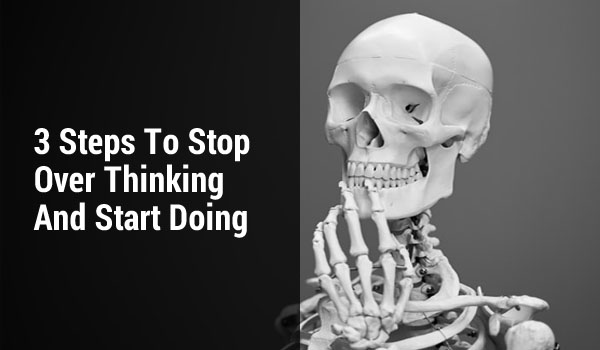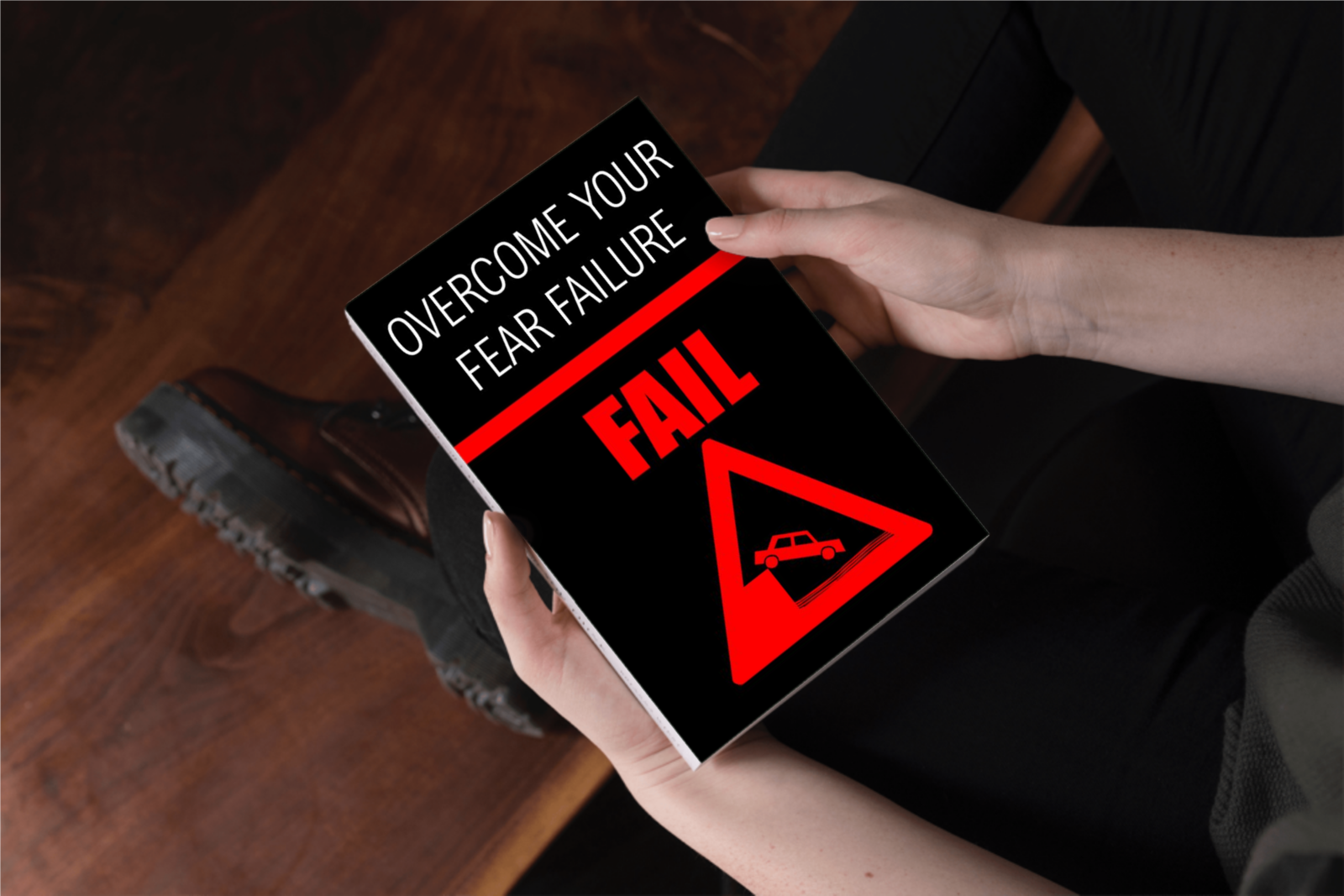Stop Overthinking and Start Doing
Stop overthinking (a.k.a. get out of your head and into your life!)
You want a fulfilling career, a home of your own, and better health. Or perhaps you have smaller goals, such as learning a new language or traveling more often. However, you never find the time or the perfect opportunity to get started.
The truth is that most people fail to achieve their goals not because they lack talent or have bad ideas, but because they quit. They get caught up in ruminating over what they might do and never take action.
If you fall into this category, it's time to make a change. Follow these steps to stop overthinking and start doing!
Stop Overthinking:
3 Quick Steps to Get You Started
1. Set Your Priorities Straight
Start by defining your priorities. What do you want to achieve the most? Set short-term and long-term goals, such as getting a promotion, acquiring new clients, or buying a home. Give yourself due dates for each of these goals. Even if you don't meet the deadline, it should be just enough to get you started.
Eliminate any distractions that are wasting your time and focus on your end goal - to acquire new leads and boost your revenue.
2. Stop Overthinking - Stop Over-analyzing and Go for It!
Do you spend hours or days thinking and planning? Do you always focus on the worst-case scenario? Are you constantly trying to read between the lines? These signs indicate that you tend to over-analyze everything.
Like it or not, your thoughts are not reality. Just because you're thinking of the worst-case scenario, it doesn't mean it will happen. Don't believe everything you feel or think. Sometimes, the best thing you can do is to go with the flow and take action. Over-analyzing situations, events, or actions rarely leads to a productive outcome.
3. Focus on the Positive
Psychologists advise us to stay positive for a good reason. A negative attitude fuels fear and anxiety, keeping you from reaching your goals. You always think of what could go wrong instead of keeping an open mind.
Keeping a positive attitude is good for your health too. It boosts your motivation and inner drive, helps you stay strong when times get tough and gives you a fresh perspective on the world around you.
Try meditation, positive affirmation, yoga, or whatever it takes to ward off negative thoughts. Focus on the good in your life and hope for the best. Negativity can be justified in the short-term, but it's not a helpful long-term state to be in.
Stop Overthinking:
Freedom Begins In Your Mind
You might be surprised to learn that the biggest obstacle to your personal freedom is right between your ears. A negative mindset is the biggest block to freedom.
There are so many parts of your life you cannot control, from the need to earn a living to finding true love. But you can control your mindset, your thoughts, and how you act in the world. So how can you overcome your psychological blocks and open your mind to achieve greater freedom?
|
1. Change the record Everyone has a constant inner monologue; what psychologists call self-talk. And most of the time, yours is probably set to negative. Any messages you get in childhood about being bad, hopeless or selfish or stupid all get absorbed in your malleable child’s brain and resurface in adulthood as your Inner Critic. The good news is that you can reprogram your Inner Critic and turn it into an Inner Coach. |
Make a list of all the negative things your Inner Critic says. Be alert for phrases that start "you always" or "you never." Watch out for "shoulds," too. Then take each negative message and turn into a positive one.
Change your self-talk broken record to a new track full of encouragement and positivity.
2. Change your expectations
Studies have shown that the most significant contributors to success or failure are your expectations. Happy people expect things to go well and mistakes or problems do not crush them, they see them only as temporary setbacks. Conversely, if the expectation is to fail any issue will confirm the expectations, and you won’t try again.
Expecting things to work out is not wishful thinking; it is choosing to be positive no matter what the circumstances.
3. Stop overthinking by changing your focus
Modern society trains us to be dissatisfied with what we have now and constantly strive for bigger, better and shiner. You can choose to step outside of this and be grateful for what you have right now.
Developing a habit of gratitude frees you from this pressure and affects the structure of your brain. Studies show that the more you feel grateful, the more resilient you become in the face of life’s ups and downs. You feel happier with what you have and more open to receiving. Even better, you rewire the neural pathways in your brain so that your mindset defaults to positivity. You start to see the good things before you notice the bad. Over time, you perceive life as positive, and your expectations change. You free yourself from the burden of negativity!
Stop Overthinking:
|
These personality traits appear to be more common among women. They develop in childhood and either exacerbate or diminish with time. If self-doubt plagues you, check out these tips to boost your confidence and trust yourself more:
Stop Overthinking and Accept Yourself
Self-doubt is part of being human. Embrace it and turn it into a strength. When used correctly, this personality trait can help you make better decisions, instead of rushing things. Think of it as a tool that guides your actions and keeps you from making costly mistakes.
Just make sure you don't overuse it though because self-doubt can also make you question your sanity and decision-making abilities.
Know You're Not Alone
Even the most successful people have doubts. They often question their actions and wonder what the right thing to do is.
Focus on building your confidence and self-esteem. You might never get rid of doubts, but you can stop them from taking over your life.
Get the Facts
Your doubts don't necessarily reflect the truth. Most times, they mirror your fears and emotional struggles. Think about your achievements and how hard you worked to get where you are today. Be proud of yourself and admire your capabilities.
Whenever you're in doubt, get the facts straight. Research the problem in question, weigh the pros and cons and ask for a second opinion.
Acknowledge Your Strengths
Make a list of things you excel in. Write down your skills and accomplishments. Accept praise from others gracefully and acknowledge your talent.
Celebrate your strengths every single day. Make positive affirmations and remind yourself how much you've done so far. Stop overthinking about what you could have done better.
Choose Your Friends Wisely
Negative people can drag you down and ruin your self-esteem. Nothing will ever be good enough for them. That's why it's so important to surround yourself with positive people who support you and listen to you instead of judging.
Define Your Values
Lastly, define your values and the values you live by daily. Once you establish those, you will have a more realistic perspective of the current situation. Focus on the things that drive your actions and are at the core of your beliefs.
Stop questioning your own decisions. Don’t waste time over-analyzing. Trust your actions and put your plans in motion. You got this!
The key to conquer your fear is in control and emotional mastery. Your emotions shouldn’t be what’s holding your back. Of course, it’s okay to feel what you do when you meet with an obstacle. The key is in not staying there when it’s time to move forward again because you will move forward again if you keep trying.
Stop Overthinking:
The High Cost of Distractions
We all get distracted. Some of the distractions are brought on by others, but a lot of the time, we do things to distract ourselves. We browse through email and social media instead of getting right to work, we get home and turn on the TV to zone out. We play on our phones whenever we need to take a break and check out for a bit. We cause these distractions for ourselves throughout the day without ever giving much thought to what it costs us in the long run.
Let’s start with working hours. Getting distracted will greatly diminish how much you can get done in a given day. Not only do you lose the time that you’re distracted, be it a minute while you check email, a couple of second while you glance at your phone to see what the flashing alert is about, or the fifteen minutes when a co-worker stops by to chat. You lose additional productive time while you’re trying to figure out where you were at and what you are supposed to be doing. The time it takes to get back into “productive mode” is often longer than the time of the actual distraction. And it all adds up. After a couple of dozen distractions in a given day, you’ve easily lost a couple of hours of work time.
By itself, it may not seem like much, but multiplied over weeks, months, or even the year, it’s a lot of time. It’s a lot of progress that you aren’t making on what you’re working on. It may be the difference between getting that raise or promotion and missing out. It may make the difference between taking your business to the next level, and barely scraping by.
|
It will make a big difference in how much money you make at the end of the year. Let’s not forget about your personal life. While you may not be able to put a dollar value on the time you waste here by letting yourself be distracted, the cost ends up being even higher. How many hours of quality time that you could be spending with your kids or your spouse are you wasting by watching TV shows you don’t really care about, browsing through YouTube videos, or wasting away scrolling through Facebook and doing a Google search that ends with a cat video after two hours of mindless browsing. Even if it’s just a few minutes here and there, this time adds up and it’s time you’re not getting back. Isn’t it time to take back control of your time and your life? Start by cutting out as many distractions as you can. Stop overthinking and start doing! |



